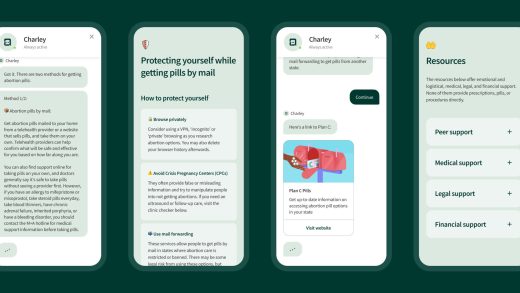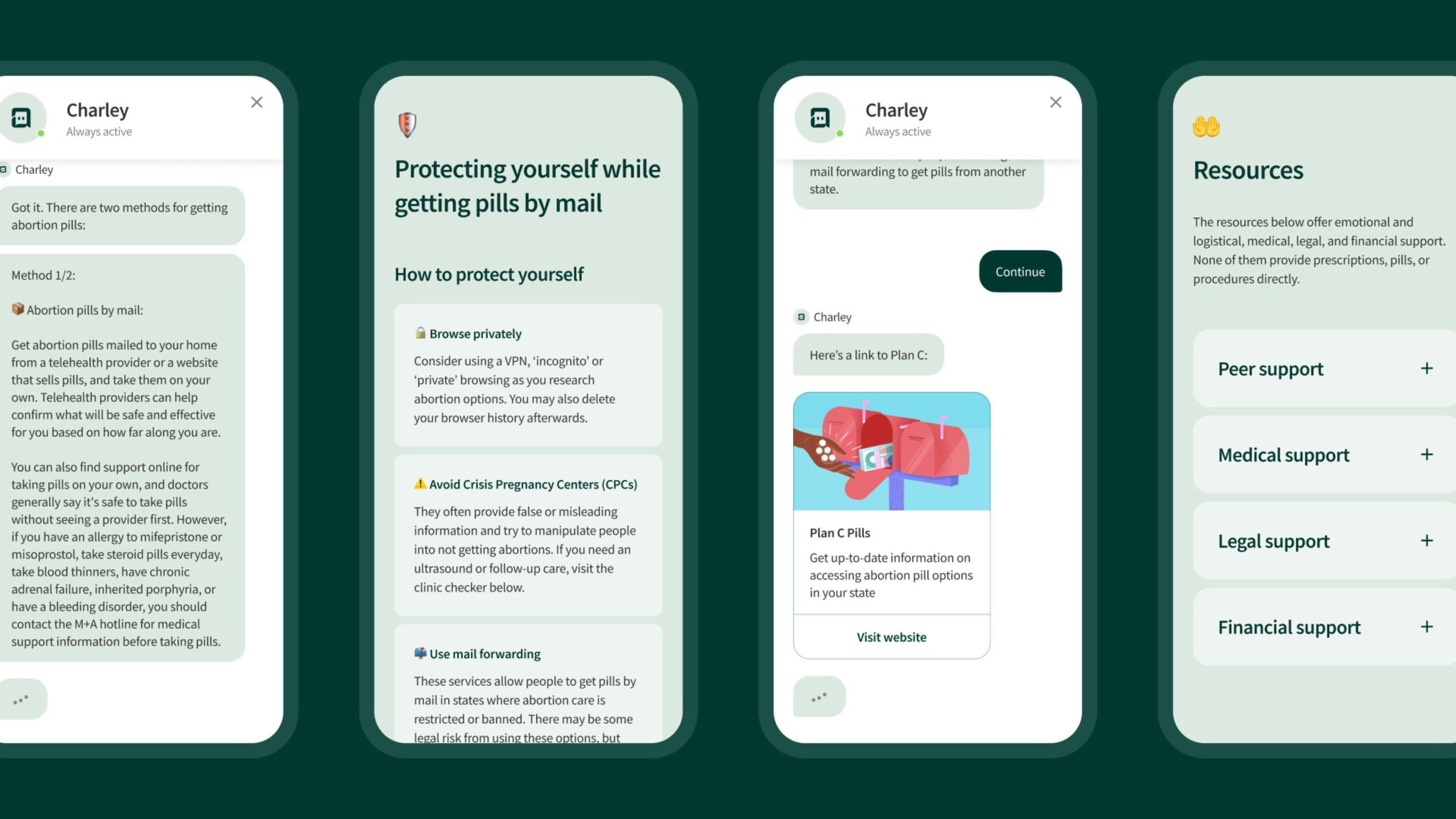Say hello to Charley, the chatbot built to get abortion-seekers the info they need
Say hello to Charley, the chatbot built to get abortion-seekers the info they need
Finding information about abortions can be a scavenger hunt. Charley wants to he cut through the noise.
As state abortion restrictions started to tighten in the aftermath of the June 2022 decision that overturned Roe v. Wade, two longtime veterans of the fight for abortion access wanted to help.
Former Planned Parenthood president Cecile Richards and Tom Subak, the nonprofit’s former chief strategy officer, wanted to help. They started by conducting a deep dive into the online behavior of abortion seekers both before and after the Supreme Court’s ruling on Dobbs v. Jackson Women’s Health Organization. It turned out that a glut of coverage made actually finding abortion resources challenging.
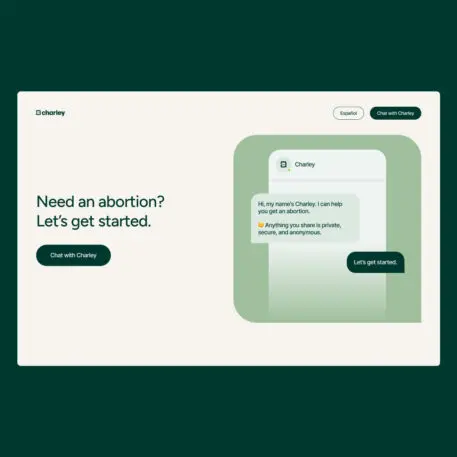
“What we didn’t expect was that abortion was in the news so much that the search landscape was actually very complicated,” Subak says. “People were getting results that had nothing to do with how to access an abortion.”
Yet, if anything, the need for abortions has risen Though a report from the Society for Family planning found only a modest increase in the number of monthly abortions—from 82,115 in July 2022 to 82,298 in June 2023—that figure underestimates the number of actual abortions needed, since abortions declined in states where it’s illegal.
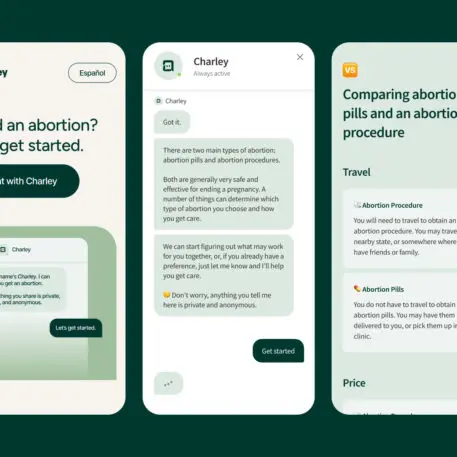
To help address the gap between the need and availability of abortion resources, in September 2023 Richards and Subak rolled out Charley—a chatbot that can be integrated into any website to offer information on abortion access. Charley draws information from INeedAnA.com, which provides clinic information, and the Abortion Policy API for state laws—both of which are regularly updated with the latest information on abortions.
“Finding information about abortions is currently a scavenger hunt,” says Kiana Tipton the executive director of Charley. “One of the best ways to get information as quickly as possible is to have a chat bot that does the search for you.”
Charley’s script, which has been reviewed by healthcare providers and lawyers, directs users through a decision tree where they can find everything from resources on abortion procedures and abortion pills, to helplines where they can talk to someone on the phone about their options. Beyond abortion access info, through its partners and co-creators—including Plan C and the M+A Hotline—Charley also provides information about accessing funding.
Charley makes it a point not to collect personal data. The bot only asks for zip codes and the date of someone’s last period so it can direct people to the relevant local resources. Its data is regularly deleted. “The court can subpoena me for Charley’s data,” said Adele Schieber, the communications director for the National Women’s Health Network, “But I’d have nothing to give them.”
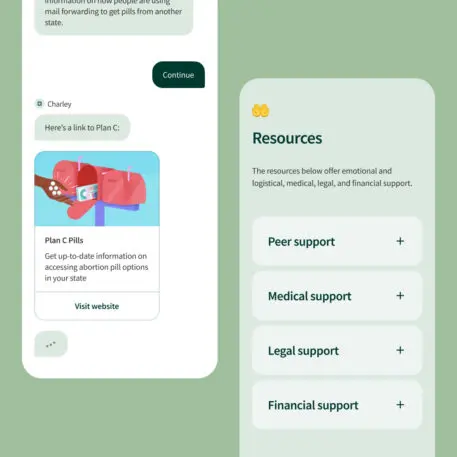
The National Women’s Health Network is one of 19 websites currently using the free-to-use, donation-funded chatbot, alongside Reproductive Freedom for All and the Abortion Access Front. Subak and Richards made it a point to ensure it was easy to implement—people who want to host Charley just have to add a few lines of javascript onto their website.
“The hardest part of implementing it, was actually explaining what it was and how it worked to non tech people within our organization and outside of it,” Schieber says. Since last September, some 25,000 people have used it, and Schieber notes it is organzation’s most popular site page.
Subak noted the most difficult part of designing Charley was understanding the language of an abortion seeker and understanding what there most immediate needs were. “We’re so steeped in the world of abortions that we use language like in-clinic vs remote or telehealth vs mail, but most people don’t get abortions and the people who do get abortions only get one. They’re not using the same language.”
Going forward, Subak is interested in streamlining the Charley experience. Currently people have to visit a website to chat with Charley and then are redirected to resources outside of Charley. “It’s a lot of jumps,” Subak says. “We want to make this easier.”
Though Schieber says some providers see chatbots like Charley as something that could supplant the advice of real physicians, “I see it as elevating their expertise and making sure that it reaches the people who need it. If you provide the best healthcare but no one knows about it, are you really providing healthcare?”
Schieber envisions a world where chatbots like Charley are the norm. “I want chatbots for how to find birth control and doctors who aren’t fatphobic,” she says. “Abortion is just the tip of the iceberg.”
ABOUT THE AUTHOR
.
Fast Company – technology
(11)

